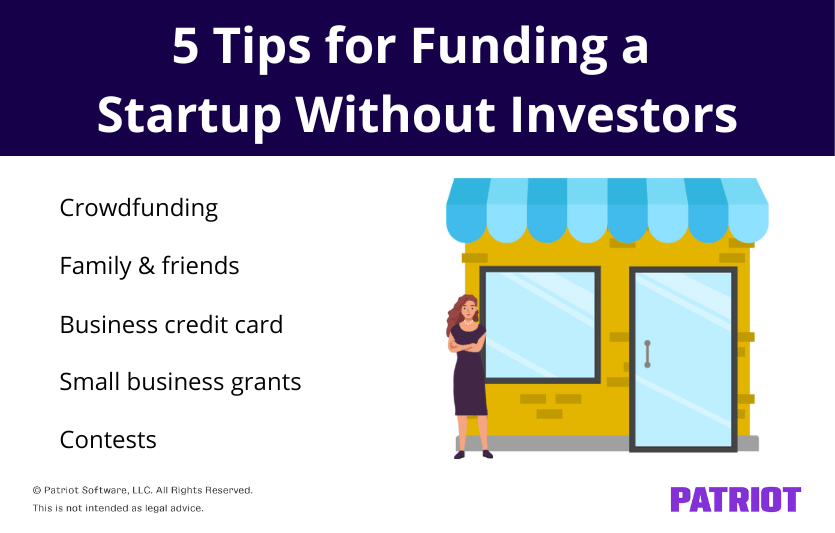Do you need investors to start a business? During the early stages of your startup, you may struggle to attract venture capitalists and angel investors. While working with investors provides a fast and sustainable way to raise money and scale your business, there are other available routes.
The first funding strategy you can consider is using personal savings to kickstart your startup. According to Forbes, 77% of entrepreneurs use personal funds to finance startup projects.
Self-financing your business can give you more control, allowing you to focus on your vision while minimizing costs. Additionally, you retain full ownership, which can help you maximize your future profits. This method, however, has its drawbacks. It can put pressure on your finances, put you behind your competitors, and is unsuitable for businesses with high starting costs.
So, what are other alternatives? Read on to learn five tips for funding a startup without any investors.
5 Ways for funding a startup without investors
First-time startup founders are usually forced to look for other funding options apart from investors for two reasons.
First, angel investors are called early investors, but before they can bankroll your business, they will want to see a prototype or product—or expect you to be on the market already. Reaching those stages requires money.
Second, the money investors offer is not a loan. It comes with strings attached. Most investors want a stake in your company or high returns. This locks out founders looking to retain 100% ownership.
If you want to raise funds for your business without angel investors or venture capitalists, try any of these five other strategies.

1. Try crowdfunding
Crowdfunding is a money-raising concept that involves getting people to contribute money to fund your business. If you have a great business idea but can’t find angel investors, you can pitch to people (preferably your future audience) and have them support you with small-dollar contributions.
With the proper promotion and campaign strategies, crowdfunding can be beneficial. You can raise enough money to expand your business, accelerate your launch date, acquire new equipment, etc.
Crowdfunding is a popular way founders raise money. According to Kickstarter, one of the most prominent crowdfunding platforms, projects on their website alone have raised more than $7 billion in pledges. Other popular sites include GoFundMe, Quirky, and IndieGoGo.
For successful crowdfunding, you need more than a persuasive pitch. You need to offer incentives to get people to give you their money.
Common forms of crowdfunding include:
- Equity-based crowdfunding: This involves giving shares of your company to people who contribute to your campaign. Additionally, you can also offer the right to a portion of revenues or profits from a specific product.
- Reward-based crowdfunding: This involves offering rewards. For instance, you can promise contributors early access to your service or discounts when your products go to market.
- Debt-based crowdfunding: This method involves raising funds by having people lend you money. You usually have to offer higher interest rates to convince lenders.
- Donation-based crowdfunding: This method involves fundraising with no strings attached and is suitable for founders of nonprofit or social businesses.
2. Get family and friends to support you
Starting a business is risky. In most cases, you need money to keep your startup afloat until it’s profitable. But, you might run out of funds before you reach profitability.
For many founders, the next logical step is looking for investors or getting a loan. But, lenders are always hesitant to give out loans to new businesses, and investors are hard to come by.
An alternative financing option can be seeking support from family and friends. Many founders, including Jeff Bezos, have used this method to fund their businesses.
There are a couple of ways your loved ones can support your new company. They could give you the money as goodwill/donations, which comes with the least strings.
Sometimes, the money from family and friends can be a loan you must repay. Others may want a stake/equity in your business. You need to ensure that you choose the option that will work best for you.
Finally, remember the repercussions of accepting loans from loved ones. It can severely hurt your relationships if you fail to repay.
3. Get a business credit card
Running a business requires a healthy cash flow, which can take time for small businesses to achieve. That’s where business credit cards come in. They can help you access the day-to-day funds you need to keep your business afloat.
Today, many companies can help you get business credit cards designed for new startups. Credit cards usually come with some fees; therefore, ensure you understand the pricing model before you sign up for your business credit card.
To get started with a business credit card, check your credit score to determine your limit. Next, ensure you have your business structure in place to negotiate a higher limit. Finally, shop around, fill out applications, and await approval.
Business credit cards are suitable for startups for a couple of reasons:
- You maintain 100% equity in your company.
- They may have low-interest rates compared to personal loans.
- Most business credit cards won’t require collateral, especially if you have a good credit score. You will, however, need a low debt-to-income ratio.
- They make it easy to track expenses.
- They allow for shared access to funds.
4. Search for small business grants
A small business grant is complimentary money startup founders can receive from the government, companies, or philanthropists. It is essentially free money, as you don’t have to make a promise to repay or give up your company equity to get it. These features make grants one of the best ways to fund a business without investors.
Grants can help you increase your visibility, making you attractive to angel investors and venture capitalists. This can ensure you get more funds in the future to accelerate your growth. However, you should know that applying for grants can be time-consuming, there are many conditions, and competition can be stiff.
There are several avenues to get grants, but the biggest one is grants.gov. It’s a federally run program that offers over a thousand different grants to startups. And, it has funding opportunities amounting to over $500 billion annually. Depending on your startup’s field, you can choose a grant from various federal agencies like the U.S. Department of Agriculture and U.S. Department of Energy.
Apart from grants.gov, there are several local government grant opportunities in your state or county. You will usually find them on your local chamber of commerce, government, or related websites. Finally, search for grants for specific groups like The Amber Grants For Women, The Minority Business Development Agency, and Fresh Start Business Grant for startups.
Besides the government, most big tech companies also offer grants. For instance, Amazon has the AWS IMAGINE Grant Program, and Google has Black Founders Funds. Check their grant programs to see if you qualify.
5. Enter and win a contest
Startup competitions offer a great avenue for any new founder to raise money for their business. If you are confident that you have a great product or service, entering a competition can allow you to sell it. Most competitions will offer significant prize money to help you scale your business to new levels if you win.
But, winning these competitions can be challenging. Therefore, ensure you’ve done the proper research before entering one. Next, create a solid business plan that can woo the judges. Finally, make a powerful pitch that leaves a good impression and shows expertise. If you are asked any questions, be prepared to answer boldly.
Competitions can give you the publicity you need to attract angel investors and venture capitalists. Even if you didn’t win the competition but made a great pitch and communicated your unique selling proposition well, you might convince someone in the audience.
Raise money smartly
Raising funds is a critical part of most startups. To make your efforts worthwhile while doing it, approach it from the right direction. If you don’t, you might waste your time and, worse, give your business a bad reputation. This can cripple your company before it is off the ground.
To avoid these pitfalls, approach the exercise well-prepared. How can you do that?
First, ensure that you know your product/service well. Second, know exactly how much you need to raise and create a solid plan of how you intend to do it. Third, have a contingency/fallback plan, and finally, consider hiring a financial expert to help you raise money. A professional will ensure you get the best deal, especially when you have to give up some equity.
These views are made solely by the author.
This is not intended as legal advice; for more information, please click here.





